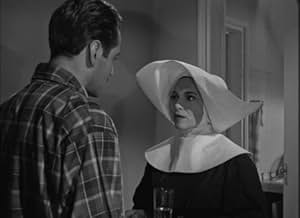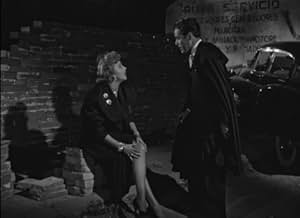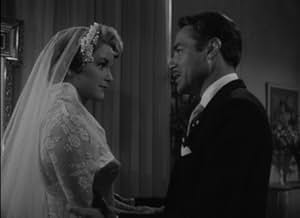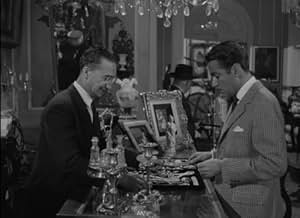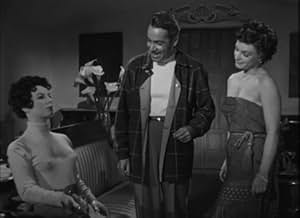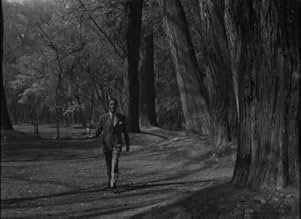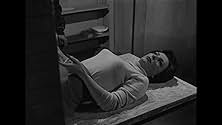IMDb RATING
7.6/10
6.2K
YOUR RATING
The delirious journey of a mentally-disordered man who is obsessed with committing the perfect crime.The delirious journey of a mentally-disordered man who is obsessed with committing the perfect crime.The delirious journey of a mentally-disordered man who is obsessed with committing the perfect crime.
- Director
- Writers
- Stars
- Awards
- 1 win & 8 nominations total
Ariadne Welter
- Carlota Cervantes
- (as Ariadna Welter)
José María Linares-Rivas
- Willy Corduran
- (as J.M. Linares Rivas)
Enrique Díaz Indiano
- Señor de la Cruz
- (as Enrique Indiano)
Carlos Martínez Baena
- Padre Alonso
- (as Carlos M. Baena)
Armando Acosta
- Hombre casa juegos
- (uncredited)
Eduardo Alcaraz
- Gordo Azuara
- (uncredited)
Janet Alcoriza
- Turista de Oklahoma
- (uncredited)
- Director
- Writers
- All cast & crew
- Production, box office & more at IMDbPro
Featured reviews
Handsome and well-heeled Archibaldo has been convinced from boyhood that he possesses a music box that has the power to kill. He embarks upon a career as a serial murderer in which his intended victims are ravishing looking females but Fate continually thwarts his lethal intentions and his murders never get past the fantasy stage.
The most notorious scene in the film and one of which only this director is capable, is where Archibaldo consigns to the flames of a kiln a wax model of one of his potential victims who has slipped through his grasp. This macabre episode has acquired a tragically ironic overtone as the woman who has modelled for the dummy is played by Miroslava Stern who was cremated shortly after filming completed, having taken her own life. Bunuel was of course to employ a 'prosthetic limb' to great effect in 'Tristana'.
Working within the budgetary limitations of Mexican cinema, director Luis Bunuel has fashioned a stylish, sophisticated and technically polished piece that contains some delicious performances and bizarre Bunuelian moments that linger long in the memory.
Although condemned by circumstances to being innocent of murder Archibaldo still feels the need to 'confess' to the police. He is politely dismissed by a detective with the words:"thinking about murdering someone does not constitute a crime." This will strike a chord with most of us I am sure!
The most notorious scene in the film and one of which only this director is capable, is where Archibaldo consigns to the flames of a kiln a wax model of one of his potential victims who has slipped through his grasp. This macabre episode has acquired a tragically ironic overtone as the woman who has modelled for the dummy is played by Miroslava Stern who was cremated shortly after filming completed, having taken her own life. Bunuel was of course to employ a 'prosthetic limb' to great effect in 'Tristana'.
Working within the budgetary limitations of Mexican cinema, director Luis Bunuel has fashioned a stylish, sophisticated and technically polished piece that contains some delicious performances and bizarre Bunuelian moments that linger long in the memory.
Although condemned by circumstances to being innocent of murder Archibaldo still feels the need to 'confess' to the police. He is politely dismissed by a detective with the words:"thinking about murdering someone does not constitute a crime." This will strike a chord with most of us I am sure!
Criminal Life of Archibaldo de la Cruz, The (1955)
** 1/2 (out of 4)
Luis Bunuel film that sounds more interesting than it turns out to be. As a young child, Archibaldo is told of a magical magic box that when turned on will kill. As an adult, Archibaldo comes across this box again and this times plans to use it to help him become a serial killer. There's a lot of black humor scattered throughout the film but very little of it made me laugh. The opening segments bashing the rich were funny but the film slowly falls apart in the middle and never regains any speed. The story is a very good one but the director does very little with it, which is a shame because this should have been a whole lot better.
** 1/2 (out of 4)
Luis Bunuel film that sounds more interesting than it turns out to be. As a young child, Archibaldo is told of a magical magic box that when turned on will kill. As an adult, Archibaldo comes across this box again and this times plans to use it to help him become a serial killer. There's a lot of black humor scattered throughout the film but very little of it made me laugh. The opening segments bashing the rich were funny but the film slowly falls apart in the middle and never regains any speed. The story is a very good one but the director does very little with it, which is a shame because this should have been a whole lot better.
In the 50's, in Mexico, Archibaldo de la Cruz (Ernesto Alonso) comes to a judge to confess crimes of his own. He tells his life since he was a spoiled boy, in the days of the Mexican revolution, when he won a music box from his mother and developed a bizarre desire of killing women, becoming a serial killer. In the end, this movie is a psychological dark comedy of the Mexican phase of Buñuel. I have just had the chance to see this film on DVD, recently released by the best Brazilian distributor (Versátil), and I found it another excellent work of Buñuel, one of my favorite directors ever. The story is very ironic and unpredictable, and I totally disagree with the User Comments `Minor Buñuel' indicated for this film. My vote is nine.
Title (Brazil): `Ensaio de um Crime' (`Rehearsal for a Crime')
Title (Brazil): `Ensaio de um Crime' (`Rehearsal for a Crime')
Yet another perfectly constructed story by Buñuel, but this time the pace of the film just doesn't feel right. As a viewer i usually have found myself trapped between the unceasing spanish dialogues. The portray of a mentally ill killer should've been more distant from the common reality, if not within the dialogues, then through the usage of scenery and theatrical production, which in this case was monotone and non-corresponding to a thrilling-tempting view
The delirious journey of a mental disordered man (Archibaldo de la Cruz) , who is obsessed in making the perfect crime. As boy, Archibaldo witnesses his governess' death and is fascinated by what he feels . As a man he's obsessed with murder and dying . Undoubtedly, death encircles the always obsessed Archibaldo, and the targets are ordinarily unfortunate women (Miroslava who subsequenly committed suicide , Rita Macedo, Ariadna Welter).
A bitter and attractive diatribe about a boy who seeing the death of his governess has a lasting effect on his adult life , as he grows up to be a demented cretin -well played by Ernesto Alonso- whose failure with women leads him to conspire to kill every one he meets , a task at which he also fails . Buñuel marshals all of his characteristic amoral wit in this story of a would-be murderer at every turn in his efforts to get his kicks from a unsuccessful sex murder . This is an enjoyable but minor psychological drama from Buñuel in Spanish with English subtitles , dealing with a strange and powerful obsession stemming from a pampered childhood . As usual, the Spaniard master schews the visual fussiness of style , opting for the straightforward camera set-up at all times. The use of props like the toy music box from his infancy which triggers off Archibaldo's lust and the wax dummy burned one of his attempts is thwarted , is all the more hilarious and surprising as a result .
This agreeable motion picture was produced in short budget by Roberto Figueroa and Alfonso Patiño Gómez ; being compellingly directed by Luis Buñuel who was voted the 14th Greatest Director of all time . This Buñuel's peculiar film belongs to his Mexican period ; in fact , it's plenty of known Mexican actors . Born in Calanda , Aragon (1900) , Buñuel then moved to Madrid to study at the university there, where his close friends included Salvador Dalí and Federico García Lorca . After moving to Paris , at the beginning Buñuel did a variety of film-related odd jobs , including working as an assistant to director Jean Epstein . With financial help from his mother and creative assistance of the surrealist Dalí, he made his first film , a 17-minute short titled "Un Chien Andalou" (1929), and immediately catapulted himself into film history thanks to its disturbing images and abstract plot . The following year , sponsored by wealthy art patrons, he made his first picture , the scabrous witty and violent "Age of Gold" (1930), which mercilessly attacked the church and the middle classes, themes that would preoccupy Buñuel for the rest of his career . That career, though, seemed almost over by the mid-1930s, as he found work increasingly hard to come by and in the pre-Spanish Civil War , he made the documentary ¨Las Hurdes¨(1933) , the Luis emigrated to the US where he worked for the Museum of Modern Art and as a film dubber for Warner Bros . He subsequently started his Mexican period and he teamed up with producer Óscar Dancigers and after a couple of unmemorable efforts shot back to international attention with the lacerating study of Mexican street urchins in ¨Los Olvidados¨ (1950), winning him the Best Director award at the Cannes Film Festival. But despite this new-found acclaim, Buñuel spent much of the next decade working on a variety of ultra-low-budget films, few of which made much impact outside Spanish-speaking countries , though many of them are well worth seeking out . As he went on filming "The Great Madcap" , ¨The brute¨, "Wuthering Heights", ¨El¨ , "The Criminal Life of Archibaldo De la Cruz" , ¨Robinson Crusoe¨ , ¨Death in the garden¨ and many others . Rating "Criminal life of Archibaldo de la Cruz" : 6.5/10 , decent movie , but much too talky , it sounds far more interesting than it plays.
A bitter and attractive diatribe about a boy who seeing the death of his governess has a lasting effect on his adult life , as he grows up to be a demented cretin -well played by Ernesto Alonso- whose failure with women leads him to conspire to kill every one he meets , a task at which he also fails . Buñuel marshals all of his characteristic amoral wit in this story of a would-be murderer at every turn in his efforts to get his kicks from a unsuccessful sex murder . This is an enjoyable but minor psychological drama from Buñuel in Spanish with English subtitles , dealing with a strange and powerful obsession stemming from a pampered childhood . As usual, the Spaniard master schews the visual fussiness of style , opting for the straightforward camera set-up at all times. The use of props like the toy music box from his infancy which triggers off Archibaldo's lust and the wax dummy burned one of his attempts is thwarted , is all the more hilarious and surprising as a result .
This agreeable motion picture was produced in short budget by Roberto Figueroa and Alfonso Patiño Gómez ; being compellingly directed by Luis Buñuel who was voted the 14th Greatest Director of all time . This Buñuel's peculiar film belongs to his Mexican period ; in fact , it's plenty of known Mexican actors . Born in Calanda , Aragon (1900) , Buñuel then moved to Madrid to study at the university there, where his close friends included Salvador Dalí and Federico García Lorca . After moving to Paris , at the beginning Buñuel did a variety of film-related odd jobs , including working as an assistant to director Jean Epstein . With financial help from his mother and creative assistance of the surrealist Dalí, he made his first film , a 17-minute short titled "Un Chien Andalou" (1929), and immediately catapulted himself into film history thanks to its disturbing images and abstract plot . The following year , sponsored by wealthy art patrons, he made his first picture , the scabrous witty and violent "Age of Gold" (1930), which mercilessly attacked the church and the middle classes, themes that would preoccupy Buñuel for the rest of his career . That career, though, seemed almost over by the mid-1930s, as he found work increasingly hard to come by and in the pre-Spanish Civil War , he made the documentary ¨Las Hurdes¨(1933) , the Luis emigrated to the US where he worked for the Museum of Modern Art and as a film dubber for Warner Bros . He subsequently started his Mexican period and he teamed up with producer Óscar Dancigers and after a couple of unmemorable efforts shot back to international attention with the lacerating study of Mexican street urchins in ¨Los Olvidados¨ (1950), winning him the Best Director award at the Cannes Film Festival. But despite this new-found acclaim, Buñuel spent much of the next decade working on a variety of ultra-low-budget films, few of which made much impact outside Spanish-speaking countries , though many of them are well worth seeking out . As he went on filming "The Great Madcap" , ¨The brute¨, "Wuthering Heights", ¨El¨ , "The Criminal Life of Archibaldo De la Cruz" , ¨Robinson Crusoe¨ , ¨Death in the garden¨ and many others . Rating "Criminal life of Archibaldo de la Cruz" : 6.5/10 , decent movie , but much too talky , it sounds far more interesting than it plays.
Did you know
- TriviaThe movie was shot in the middle of a big economic crisis for the Mexican cinema. Production was about to be shut down a few times and the famous scene with the mannequin being cremated was filmed only once because they couldn't afford another mannequin.
- GoofsWhen the nun falls down the empty elevator shaft she screams loudly but the sound is obviously that of a man; in fact, it sounds like a Wilhelm Scream.
- ConnectionsFeatured in Miroslava (1993)
- How long is The Criminal Life of Archibaldo de la Cruz?Powered by Alexa
Details
- Release date
- Country of origin
- Languages
- Also known as
- The Criminal Life of Archibaldo de la Cruz
- Filming locations
- Production company
- See more company credits at IMDbPro
- Runtime1 hour 29 minutes
- Color
- Sound mix
- Aspect ratio
- 1.37 : 1
Contribute to this page
Suggest an edit or add missing content


